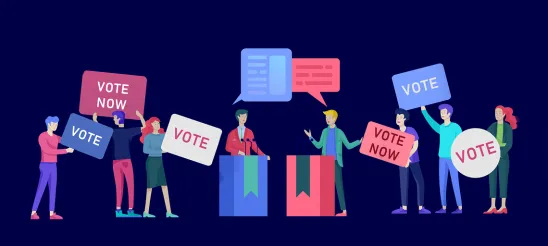With election season underway, employers are considering how to address employees discussing politics and expressing their political beliefs in the workplace. Managing these issues can create significant legal and employee relations challenges for employers, impacting employee morale and productivity. It is important for employers to understand the laws impacting political speech in the workplace, including freedom of speech laws, labor laws, and anti-discrimination laws.
First, the right to freedom of speech found in the First Amendment of the U.S. Constitution generally does not apply to private sector employers. That being said, some states have adopted freedom of speech laws. For example, Connecticut General Statutes section 31-51q extends federal and state constitutional free speech protections to employees and prohibits employers from disciplining or discharging employees for exercising their free speech rights, provided such exercise: (1) does not interfere with the employee’s job performance or relationship with the employer, and (2) addresses a matter of public concern (e.g., relates to political, social, or other community issues, such as speech related to a communicable illness that impacts public safety). Connecticut law does not protect private or public employees from discipline based on speech made pursuant to the employee’s official job duties. Similar laws exist in other states.
Second, the federal National Labor Relations Act (NLRA) may be implicated if an employee’s political speech or expression relates to working conditions. The NLRA protects the rights of both union and non-union employees to engage in “concerted activities” for purposes of mutual aid and protection, such as improving the terms and conditions of employment. While the NLRA does not limit an employer’s ability to regulate speech that is purely political in nature, the NLRA can apply if an employee’s political speech or expression is related to working conditions (e.g., advocating for increased minimum wage or expanded leave laws). Unfortunately, no clear test exists to determine whether that nexus exists, and, in the absence of such guidance, employers should evaluate this issue on a case-by-case basis.
Even if the political speech or expression relates to working conditions, the General Counsel to the National Labor Relations Board, who is responsible for enforcement of the NLRA, has suggested that employers may enforce otherwise “lawful, neutrally applied work rules.” The General Counsel did not elaborate on what may qualify as such a permissible work rule, but it is clear that the NLRA protects an employee’s right to wear or display political buttons, t-shirts, or other insignia that are related to working conditions. Therefore, employer rules that restrict or forbid such displays are unlawful unless an employer demonstrates “legitimate” or “special” circumstances, respectively.
Lastly, various civil rights and anti-discrimination laws may also be implicated when employees participate in political speech or expression at work. Political speech and expression may relate to gender, sex, race, religion, disabilities, age, and other characteristics protected by Title VII of the Civil Rights Act of 1964, the Age Discrimination in Employment Act, the Americans with Disabilities Act, the Connecticut Fair Employment Practices Act, and other state and federal anti-discrimination laws. Therefore, employers should be aware that corrective action or discipline based on such speech and expression may create risk of discrimination or harassment claims.
Based on the myriad laws that may be implicated by employee expressions of political speech in the workplace, employers should proactively prepare to address these issues and may wish to consider taking the following actions:
-
Reviewing federal and state laws that may be implicated by the actions of their employees.
-
Considering legally-compliant and non-discriminatory policies and procedures that prohibit non-work-related political speech and expression in the workplace.
-
Revising dress code policies that address political buttons, pins, t-shirts, hats, and other political insignia to ensure such policies comply with applicable law, including the NLRA’s parameters on such restrictions.
-
Reminding employees of their policies regarding discrimination, harassment or retaliation in the workplace.
-
Ensuring that they are implementing and enforcing such policies and procedures consistently and uniformly to avoid disparate or differential treatment.
While outside the scope of this article, there are other considerations related to employee political speech, including expressions on social media during off-duty activities, time off from work to vote, and/or time off to campaign or protest, among other issues.
While the information contained in this material provides a general overview of the law, each employer will likely face unique business- and employment-related challenges and issues related to these issues. Therefore, to ensure compliance with the law, employers are encouraged to seek competent legal counsel when responding to employee concerns or considering changes to business operations based upon these issues.




 />i
/>i

